America’s economy and culture are defined in large measure by business and social phenomena that have exerted a huge amount of peer pressure for people to opt in. Consider football, the leading American spectator sport. Or Black Friday, the leading American consumer bloodsport. Or Facebook, the leading American social network. Sure, there are always outliers and rebels who stand on the sidelines: the Commies who argue against consumption, the nerds who prefer programming to football. But basically, these entities have generally occupied a rare and coveted commercial space. Those who didn’t participate were somehow out of it, not cool, marginalized. And so everybody, when they came of age, opted in.

But quickly, almost out of nowhere, we’re seeing an increasing propensity of people to opt out of these powerful trends. And the more people do it, the more acceptable it comes.
Football is the most American of sports, the Alpha Male of games. But revelations about concussions and more evolved parents (even many football players say they don’t want their kids suiting out) is taking a toll. While television ratings remain high (and Super Bowl ad rates are likely to set a new record), more boys are opting out. After growing inexorably for decades, Pop Warner, the largest little league football organization, reported that participation fell 9.5 percent between 2010 and 2012.
After watching football games on Thanksgiving, Americans hit the malls on Black Friday. With the rise of the internet and the growing desperation of bricks-and-mortar retailers, Big Store has been hyping the Thanksgiving weekend shopping season relentlessly. But, as with football, Americans seem to be boycotting what has evolved from a national pastime into a violent bloodsport. According to the National Retail Federation, the number of people who said they’d shop at stores in between Thanksgiving and the following Sunday fell from 147 million in 2012 to 140 million 2013. That’s seven million consumers who opted out. Many preferred to shop online, or were simply turned off by the spectacle. And it’s just beginning. On the Wall Street Journal op-ed page, which usually celebrates American-style capitalism, this was the headline on columnist Peggy Noonan’s column: “Next Year Stay Home, America.”
On social networks like Facebook and Twitter there is immense, unavoidable pressure to opt in. Choosing not to join is choosing not to be part of the conversations among all your friends, frenemies, and interesting strangers. And sure enough, the data show that these networks continue to add users to their impressive membership rolls. But here and there, if you listen closely, you can detect signs of opting out. We all know teenagers who keep their Facebook accounts active, but spend all their time on Snapchat, which doesn’t leave the same digital footprint. And some professionals (ok, me) consciously boycott Twitter for the weekend.
Not too long ago, you simply had to have cable television in order to be part of the national popular culture conversation. That’s where all the most talked-about sports (ESPN), drama (HBO), and news (CNN) took place. If you didn’t have a set-top box and an expensive subscription to 400 channels, you were out of it. And so year after year, cable subscriber numbers grew along with the population. But there’s been a disruption in the force. More and more interesting programming is being delivered by alternate means—through Netflix, or YouTube. Apps, tablets, and workarounds mean you don’t have to have an expensive cable package in order to watch the show your friends are watching—which is a boon for thrifty millennials. And so in 2013, for the first time ever, the number of Americans paying for television reception via satellite or cable, will likely decline.
Look, the NFL, Nordstrom, Facebook and Time Warner Cable aren’t going to collapse in 2014. But the growing incidence and acceptance of opting out—the more people do it, the cooler it becomes—means they will face pressure to change the rules of the games they play. And their travails should make everybody else think twice. Peer pressure, habit, tradition and marketing simply don’t possess the gravitational force they did in the past.






